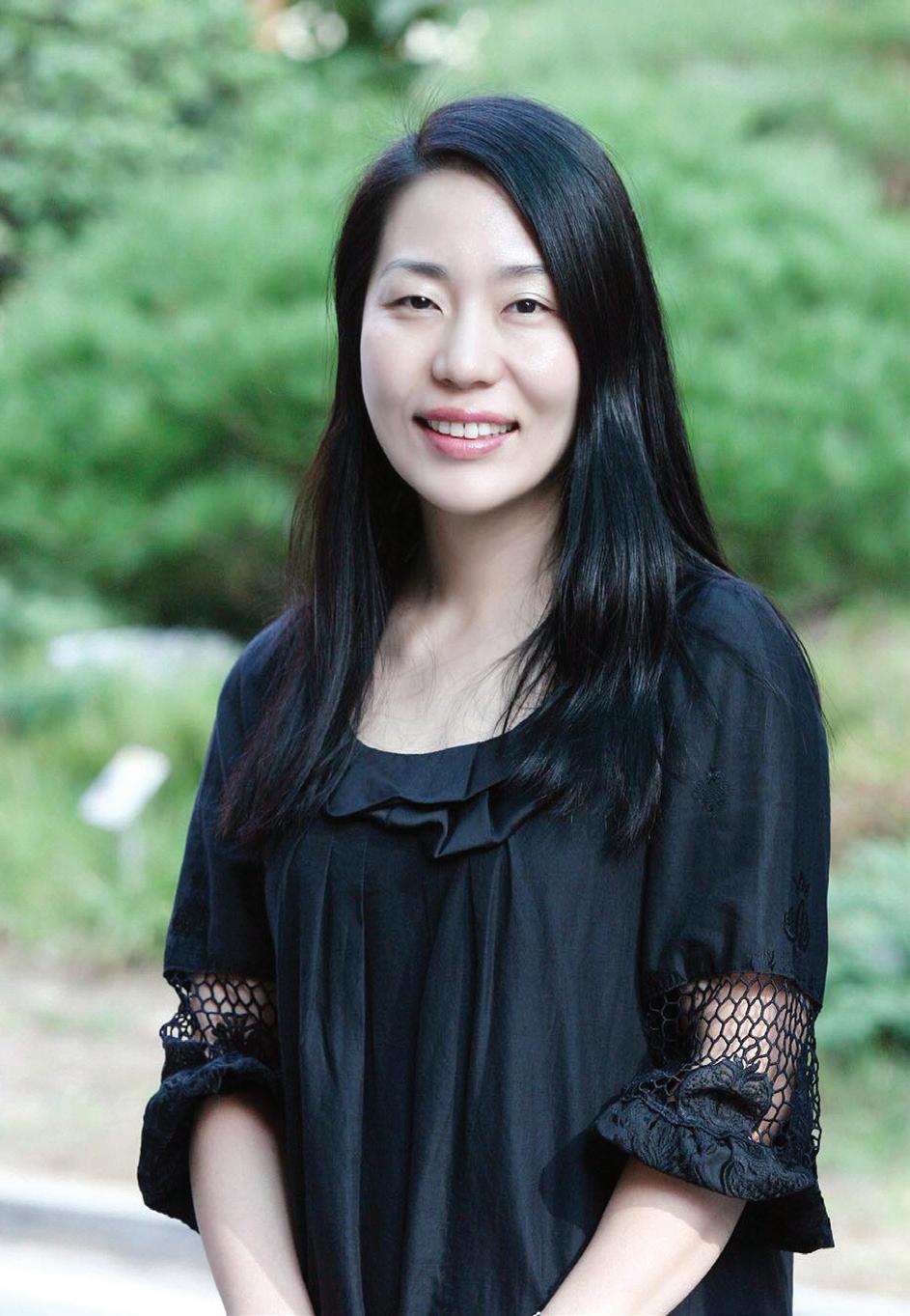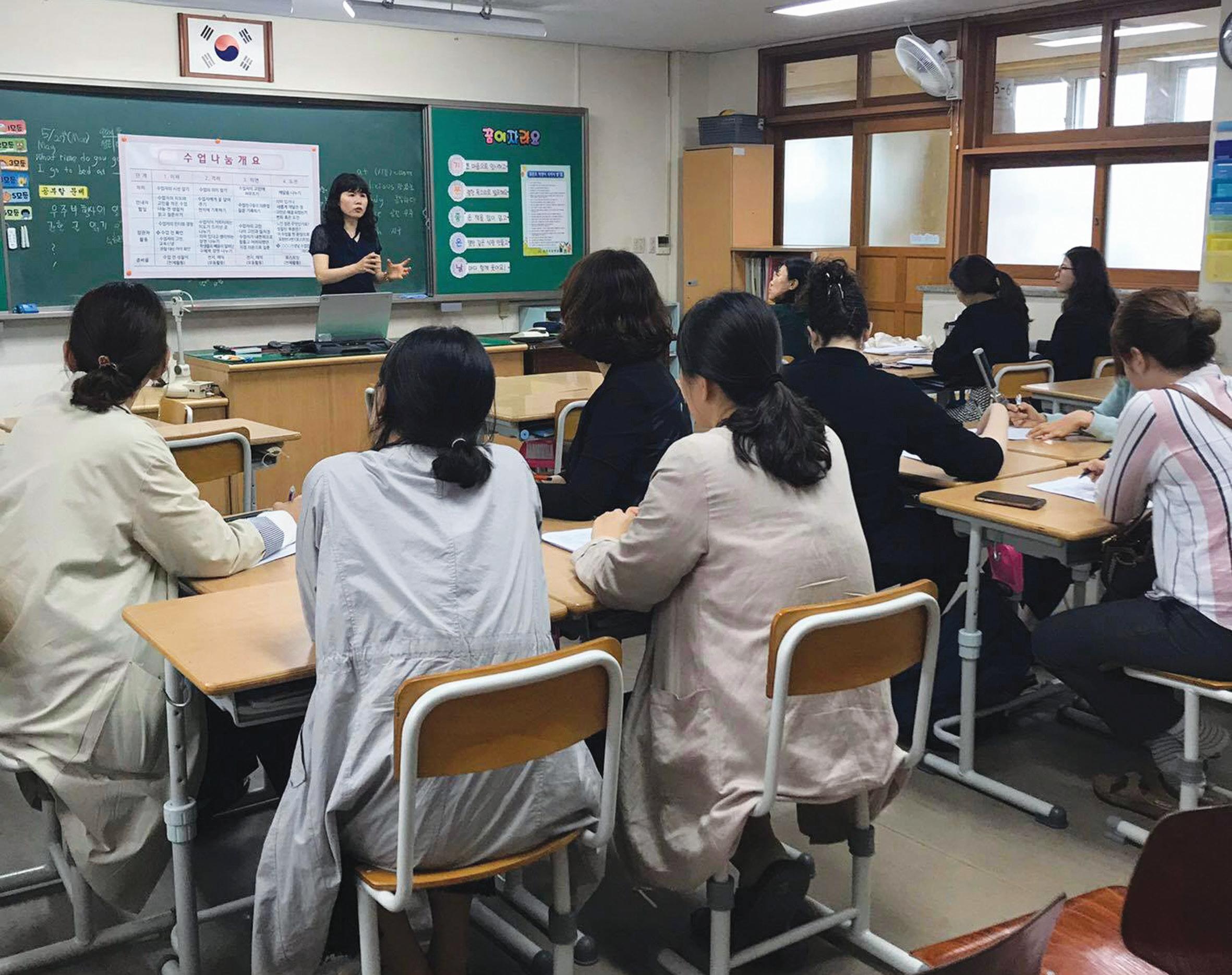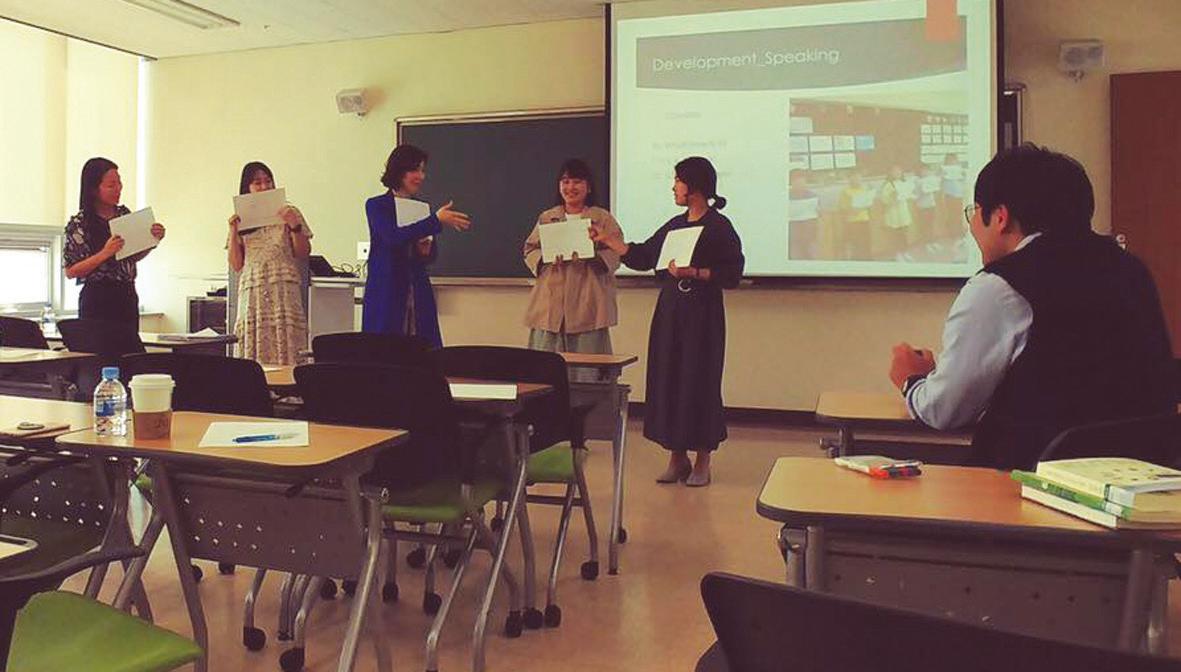
10 minute read
Language Teaching: On Being a Master Teacher
On Being a Master Teacher
Interview by Dr. David E. Shaffer
Advertisement

Billie Kang conducting an “open class” open to parents, teachers, etc.
We all know what a postmaster is and what a headmaster is, and we’re all familiar with “master of ceremonies” and “master craft sman.” But what about “master teacher” in the Korean educational context? Th e Gwangju News recently approached Master Teacher Billie Kang during her school break to tell us a little about herself, her teaching, and becoming a master teacher. Billie is an active member of the Gwangju-Jeonnam Chapter of Korea TESOL and has been for quite some time. — Ed.
Gwangju News (GN): Th ank you, Billie, for granting us this interview. We know how busy you are. Well, to begin with, would you tell us a little about yourself? Billie Kang: I’ve been an elementary school teacher in Gwangju for over 20 years and have been a master teacher for nine years now. I’ve enjoyed most of my teaching career, especially since I became a master teacher, because a master teacher’s sole focus is on teaching itself. Other than teaching, I love traveling and meeting people from diff erent language and cultural backgrounds for growth through sharing. you tell us about that experience, and why you decided to study abroad? Billie Kang: I graduated from GNUE [Gwangju National University of Education], majoring in elementary education and minoring in music education. English has always been my favorite subject – to both teach and learn – but GNUE didn’t have an English education major while I was studying there. Th erefore, aft er graduation, it just seemed like a natural decision for me to further my studies in English teaching. With a bit of an adventurous spirit, I applied for my master’s degree in the United States. I started at SUNY-Buff alo [the State University of New York at Buff alo] in 2001 and came back with an MA in TESOL aft er a year and a half.
GN: In just a year and a half, that’s exceptional! I’m sure our readers are curious about your name, “Billie.” I don’t know any other Korean with that name. Could you tell us how you got it? Billie Kang: My parents had such a sense of humor as to name me after the typhoon that crossed the peninsula at about the time I was born. I appreciate the uniqueness of this name more now than in my childhood; it was just too weird of a name for a Korean kid to have when I was young. I’m not saying I had a hard time growing up with this name, but it was certainly quite different from the Chinese character-based names everyone else had. The most frequent question I get is either “What’s your real name…your Korean name?” or “How did you get this name?” – just as you asked.
GN: What made you decide that you wanted to be an elementary school English teacher? Billie Kang: Honestly, it was more of a compromise than a choice or commitment that I applied to GNUE. I was considering applying to an English department in Seoul, but GNUE was a safe and guaranteed plan for my future that my parents approved of.
GN: What was it about English that you liked most? Billie Kang: Mainly, I like the musical aspect of it: the pronunciation, intonation, and stress. For me, speaking English feels exactly like singing a song. Plus, there are so many fun ways to study English; English study materials are abundantly accessible through various media.
GN: Did you have a favorite English teacher? Billie Kang: I’ve been extremely blessed with my English teachers since middle school. I cannot remember any teacher who taught me English who wasn’t a big help. They were all great in their own ways. I’m most thankful to Son Okyeong of Speer Girls High School, Mark Murdaugh at CNU, Dr. Yang at SUNY-Buffalo. They all served as role models for me to become a good teacher, never ceasing to become a better one the next day.
GN: You’re an officially designated “master teacher.” When did this government program begin and what’s the purpose of it? Billie Kang: It had its trial period starting in 2008 and received final approval in 2012. Its purpose is to provide a second career track for teachers to pursue: One was promotion to vice-principal and then to principal, and the second to become a master teacher. Promotion to vice-principal and principal has really been competitive, and even more so now than in the past. The master teacher concept was conceived of in part to lessen the burden on the existing promotion system but more importantly to help build a school culture centered on teaching and research to improve teaching expertise.

Billie Kang, Master Teacher.
GN: Building a school culture doesn’t sound like an easy task. What specifically does a master teacher do to create an improved school culture? Billie Kang: True, it isn’t an easy task that one master teacher can do. You cannot expect that one day there’s a new master teacher at school wanting to change the school culture and it happens overnight. It can take a year or the full four years of the master teacher’s tenure at a school, or it might not even happen. All we as master teachers can do is “try” – try to open opportunities for others to see and experience more and hopefully better ways of doing things. It’s eventually up to the teaching staff to decide on what school culture they’re willing to build.
GN: As an elementary school master teacher, what are your main duties? Billie Kang: The first and most important responsibility for a master teacher is to teach. Master teachers’ classes are supposed to be open at any time for any teacher to observe, and twice a year, they’ve scheduled open classes that are open to any teacher who wants to observe, even to teachers from outside the school. Other responsibilities include supporting teachers with consulting, ranging from lesson planning to class management and to developing and publishing class materials.

Discussion after Billie’s open class as part of a guest master teachers’ workshop.
GN: Developing and publishing class materials – could you tell me more about what this involves for a master teacher? Billie Kang: In my personal experience as a master teacher, I’ve made good use of the school webpage. There I uploaded my lesson plans and lesson materials for each lesson. I took my open classes as a chance to introduce and promote my lesson plans and materials uploaded to the school webpage. This has been working well and receiving positive feedback and appreciation.
GN: What are the most rewarding aspects of being a master teacher, and also, what might be the most difficult aspects? Billie Kang: The most rewarding aspects have been finding a new passion in teaching regarding non-violent communication and restorative justice, and sharing what I learned with other teachers during mentoring or consulting time. The challenge still is to establish one’s position as a master teacher at school; there are only about two dozen elementary school master teachers in Gwangju now, which makes us a newly made minority with difficulty becoming safely rooted in the pre-existing school system.
GN: You mentioned non-violent communication and restorative justice. Is dealing with bullying an important part of mentoring as a master teacher? Billie Kang: This is the area that I started with personal interest and has become the biggest part both of my teaching students and mentoring teachers. Bullying can be a part of this but mainly it’s about keeping the connection between speakers and listeners; there are meaningful techniques and activities to support these ideas, but it’s mainly the paradigm that matters – a paradigm that values the connection, or the “effort” to connect, the most.
GN: Do you find that other teachers are, in general, receptive to the advice you as a master teacher have for them? Billie Kang: It’s been more about sharing ideas and figuring things out together with other teachers than to merely give advice, and it’s worked out pretty well in
that many of the teachers showed their appreciation later on. Th ere’s an offi cial activity called “master teachers’ mentoring” that most master teachers voluntarily do; we advertise at the beginning of the school year and mentor throughout the year the teachers who apply. A public document goes out listing each master teacher’s mentoring areas; for example, my mentoring areas included English education, non-violent communication, and restorative justice. If teachers fi nd any master teacher’s area that interests them, they can apply and set up a mentoring program for the year with the master teacher they want. I’ve mentored 5–6 teachers each year for the past four years, and it’s been one of the most rewarding experiences that I’ve had as a master teacher. It’s never been just a one-way teaching or lecturing experience; it’s always been a mutual growth through exchanging ideas and helping each other.
GN: Do you fi nd at times that, rather than giving out teaching advice, you’re being asked to be more of a general counselor, that is, being asked for help on personal matters? Billie Kang: Yes, it happens a lot. Master teachers have their own offi ce, which makes personal communication easier space-wise. Also, I might add that a master teacher’s job responsibilities vary from case to case. For example, some master teachers are asked to do more administrative work than others; teaching hours vary as well. Th is job title was created to promote a healthy school culture, where the master teacher’s teaching and research can inspire other teachers. So, one purpose of having master teachers in schools is to help build a better workplace culture to improve teachers’ teaching and voluntary research work.
GN: You’re a member of the Gwangju-Jeonnam Chapter of KOTESOL. Do you think that KOTESOL has in any way helped you as a master teacher or as a teacher in general? Billie Kang: KOTESOL has always been helpful to me as one of my learning resources and as a community

for all aspects of my life as a teacher. I like KOTESOL especially for its good balance between the formality and the “casuality” – is that even a word? I mean professional development is certainly a formal activity where teachers share useful information and all, but I still feel very comfortable and safe about speaking up and participating. Diff erent ideas are presented; they’re accepted or challenged at the workshop sessions, all for mutual benefi t. And there are great community leaders in our chapter who keep Gwangju KOTESOL moving forward. It’s such a comfort to be reminded that KOTESOL is always there to help me to become a better teacher.
GN: All teachers aspire to be better at what they do, and I’m sure you’ve been of immeasurable help to many as a master teacher. Th ank you, Billie, for sharing so much with us about yourself and what you do as a master teacher. It’s been quite informative.
GWANGJU-JEONNAM KOTESOL UPCOMING EVENTS
Check the chapter’s webpages and Facebook group periodically for updates on chapter events and online activities.
For full event details:
The interviewer
David Shaff er has been a resident of Gwangju and professor at Chosun University for many years. He has been with KOTESOL since its early days and is a past president of the organization. At present, as vicepresident of the Gwangju-Jeonnam Chapter of KOTESOL, he invites you to participate in the teacher development workshops at their regular meetings (presently online). Dr. Shaff er is currently the chairman of the board at the Gwangju International Center as well as editor-in-chief of the Gwangju News.










